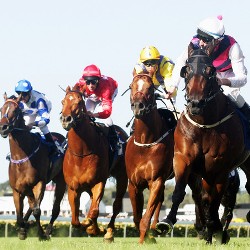Australian Breeders Taking Advantage of Chinese Equine Market

While horse racing as a sport may not traditionally be associated with China, the industry has nonetheless witnessed an impressive surge in popularity of late. As a result, investors have now started turning their attentions towards Australia in order to purchase thoroughbreds, a nation that boasts more racecourses than any other country, and positioned just behind the USA and Japan in the amount of annual prize money its industry distributes.
Industry Background
Horse racing has always had a somewhat flighty standing in Chinese culture. During the Zhou Dynasty (1050-771 BC), for instance, it was considered an integral part of everyday life, but over the past few millennia has fallen in and out of favor with Chinese rulers.
In the 19th century, British settlers then contributed to a resurgence of interest in the sport after bringing thoroughbred horses into vast country, leading to the Shanghai Racecourse and the Kiang-wan International Recreation Grounds becoming hugely popular venues during this period. By the 20th century, however, these courses were subsequently shut, with horse racing then banned in 1945, aside from exceptions being made for certain ethnic minorities for whom horse racing represented a major part of their culture.
In the 1990s, horse racing then made a tentative return to China, with the China Speed Horse Race Open held in Wuhan in 2008, and the Wuhan Jockey Club organizing more than 80 race meets six years later. 2014 subsequently proved a pivotal year for the industry, as horse racing was officially allowed to return to the Chinese mainland, and foreign horses, trainers, and jockeys all permitted to take part in events.
Back in Vogue
The China Equine Cultural Festival hosted four races in Ordos in 2016, with over 30 thoroughbreds competing for top prizes totaling over 1 million yuan ($151,000). Meanwhile, 1.4 million viewers tuned into the races thanks to online live-streaming services, in the process confirming that horse racing was returning to popularity once more.
A century of disinterest in horse racing, however, has resulted in a dearth of breeders in China, meaning that Chinese investors have therefore needed to look overseas in order to buy horses. Australia has been one of the breeders reaping the benefits of this upsurge in interest, with Chinese investors particularly targeting those horses originating in Australia’s Hunter Valley region.
Boom in Australian Breeding
As well as purchasing thoroughbreds in Australia, a number of major stud farms are now owned by investors from Hong Kong, who have also been racing their horses in the country. Commenting upon the development, Adam White, bloodstock manager at Vinery Stud in the Segenhoe Valley, explained:
“The last probably half a dozen years we’ve seen a lot of Chinese groups invest in our industry, which is fantastic. They’re not only racing horses here but they’re now breeding horses here.”
Competition from Hong Kong
One problem for Chinese horse racing is that Hong Kong and Macau are both able to host horse racing events without restrictions because of their relaxed gambling laws. This has resulted in the Hong Kong Jockey Club organizing over 700 races each year in the Special Administrative Region, generating a whopping $27.7 billion in revenue last year.
Australian Thoroughbreds Exports
Industry analysts have been wondering whether China will be able to maintain the interest of the Australian horse racing industry going forward. While there is currently a lot of short term investment taking place in China, horse racing is an expensive pursuit, and if Chinese interest in the sport starts to dwindle, then Australian breeders may be tempted to once more refocus their attention on the established horse racing markets of Europe and the US.
One thing that is for certain, though, is that developments currently favor Australian horse breeders, and that while China is a convenient place for Australians to do business, there are also many other international markets that will continually be calling out for Australian horses.
In the meantime, Chinese equine firms have already purchased horses from Europe, Africa, and other Asian countries in the past, and while Australian horse breeders remain in the spotlight for now, the market is actually more balanced than it first appears. Therefore, Australian breeders may currently be in a good position to make a lot of money from China, but if it gets too complacent, and the quality of its thoroughbreds begin to dip, then Chinese investors will simply resort to spending more money in order to have quality horses imported from other parts of the world.






